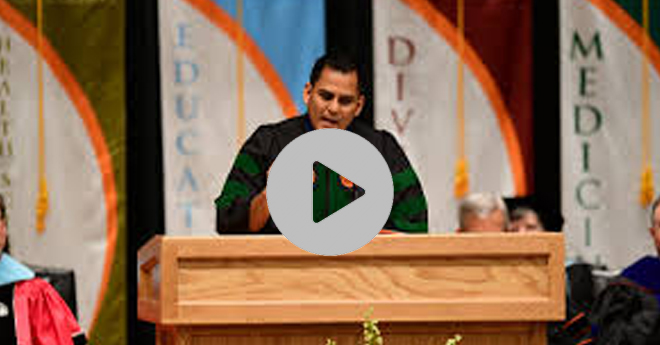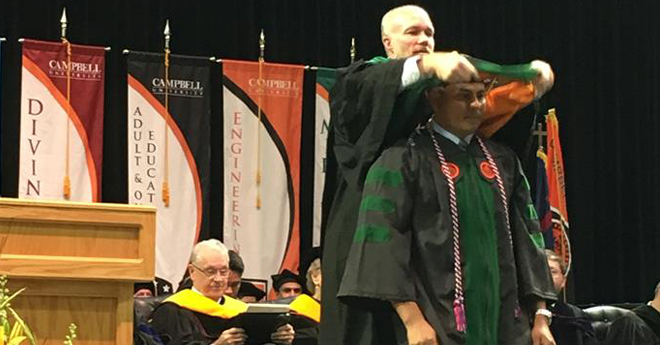Espino Reflects on Experiences as a Med Student and What his Country Needs from Him
A 2014 Tillman Scholar, Erasmo Espino recently graduated from Campbell University School of Osteopathic Medicine with a Doctor of Osteopathic Medicine (DO) degree. Erasmo is a 15-year Army veteran, and served with 7th Special Forces Group as a Special Forces Medical Sergeant while on active duty. He deployed to Iraq, Afghanistan, and multiple countries in Central and South America. In 2011 Erasmo left active duty to obtain a bachelor’s degree and simultaneously served with 20th Special Forces Group. He deployed three times as a full-time student while fulfilling the role of Special Forces Team Sergeant.
With graduation season upon us, Erasmo recently shared his experiences as a med student and his desire to make an impact in his community upon completing his residency at Emory University for Emergency Medicine.
“I have to admit that in the midst of all the endless nights spent studying, submerged in books and empty cups of coffee, my mind occasionally drifted to feelings of doubt. My friends continue to deploy and as I sit here, the battles continue. I wonder if I’m doing enough. I begin to wonder if pursuing a career in medicine was indeed my true calling post military. On top of everything else, the competitiveness in medicine along with the massive workload, sleep deprivation, and high expectations create a suffocating atmosphere that never relents. The pressure to perform is always high and I say to myself “I can take it, I’ve been through worse,” but the reality is that it hasn’t been a cakewalk by any means. So that’s why every once in while it is refreshing to be reminded why I chose to become a doctor. This reminder comes in the form of the patients that I see on a daily basis.
The following story is about one of those patients:
During one of my Internal Medicine rotations in Texas I was finishing a note on a patient when the attending physician said, “Go see the patient in room 22”. Usually that means gather a history, perform a physical exam, and provide a plan for the next step in a patient’s care. I pulled the curtain and saw an elderly gentleman lying uncomfortably on the bed. It’s early summer and he’s wearing a jacket. His skin is flushed and sweat is soaking through his clothes. He looks surprisingly well for his age. It’s all part of my assessment that begins even before I introduce myself. There is a smell in the room that I recognize. It took me back to Ranger School. It was the smell of ammonia from muscle breakdown after days in the outdoors. “Good afternoon, my name is Student Doctor Espino, I’m part of the health care team that is going to be taking care of you today.” I extend my hand. He slowly takes it and gives it a gentle squeeze. He looks at me, but not really. He mumbles something incoherently and I immediately know this is going to be a difficult encounter.
This an elderly person that comes in with an altered mental status, an all too often situation that happens in the ER. It is now my job to find out why. Why is he here? Why is he acting like this? Is this how he normally acts? Is he sick? Is there something serious going on with him that I need know? Heat exhaustion, stroke, hypoglycemia, medication overdose? The list of possibilities is endless. The paramedics tell me the police found him wandering alone on the roads and noticed something wasn’t right. I quickly assess him. His vital signs are stable and he follows my commands. He denies pain and besides being moderately dehydrated, his physical exam was normal. He couldn’t remember much besides his name. I asked him if he had relatives, a wife, or children. He says yes, but when I ask him to provide me with a name or contact information, he looks away. His expression slowly changes to worry or perhaps fear. His lips tremble as if the words are at the tip of his tongue, but they just won’t come out. I can sense the frustration. He has dementia, most probably Alzheimer’s. I suspect he has been walking around aimlessly, scared, and lost for god knows how long.
I grab his hand and say “It’s OK, don’t worry. We will figure it out.” I open the plastic bag in the corner and pull out his wallet. I see a fresh military Identification Card. “First Sergeant, E8 – retired.” I did the math in my head. If I was a betting man, he served in Vietnam and easily put in over 30 years of service as an NCO taking care of his troops. Probably a paratrooper, most definitely a patriot. I wondered what those tired, blue eyes had seen in his day. I’m sure he experienced things that most could never fathom. Joy, pain, sorrow, yet right now, he can recall none of it. It’s as if it never happened. I’d seen the same scenario over and over throughout my first year of clinical rotations. His wife was either deceased or in a home. His children were grown, married, and living their own lives probably unaware that their father was lost. It would take a while before we got lab results back and probably even longer to get his medical records transferred from the VA to confirm the diagnosis. In the meantime, the nurse comes in and says she’s going to change him and clean him up a bit. I tell her “Its OK, I got it, but can you get me some food and water for him please.”
I can’t cure or even slightly regress his tragic disease, but I can make him comfortable and ease his anxiety as best I can. I try my best to learn from and treat every patient I encounter with the utmost dignity and respect, but for First Sergeant I was going to go the extra mile the way he did for his soldiers… and his country. As I’m leaving his room I remember, “this is why medicine.” Of all the great things I wish to do after I finish medical school and residency, I realized the best thing I can do now is embrace the long and arduous process of learning so that I can become the most competent physician that I can be. The challenges that our country faces are critical and health care is no exception. The physician shortage is huge and will only continue to grow. The measure of whatever impact I have will depend on how well I can take care of my patients. That is what my country needs me to do now, become a good doctor.”
***Details regarding the patient were changed to protect their privacy.***





